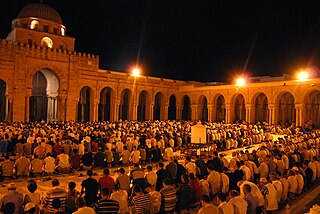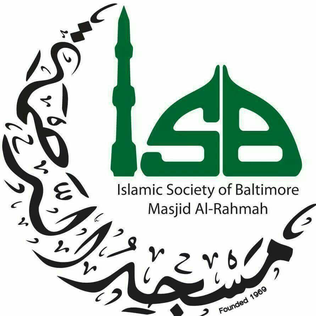Related Research Articles
The Five Pillars of Islam are fundamental practices in Islam, considered to be obligatory acts of worship for all Muslims. They are summarized in the hadith of Gabriel. The Sunni and Shia agree on the basic details of the performance and practice of these acts, but the Shia do not refer to them by the same name. They are: Muslim creed, prayer, charity to the poor, fasting in the month of Ramadan, and the pilgrimage to Mecca for those who are able.

The Hijri calendar, also known in English as the Muslim calendar and Islamic calendar, is a lunar calendar consisting of 12 lunar months in a year of 354 or 355 days. It is used to determine the proper days of Islamic holidays and rituals, such as the annual fasting and the annual season for the great pilgrimage. In almost all countries where the predominant religion is Islam, the civil calendar is the Gregorian calendar, with Syriac month-names used in the Levant and Mesopotamia but the religious calendar is the Hijri one.

Ramadan is the ninth month of the Islamic calendar, observed by Muslims worldwide as a month of fasting (sawm), prayer, reflection, and community. A commemoration of Muhammad's first revelation, the annual observance of Ramadan is regarded as one of the Five Pillars of Islam and lasts twenty-nine to thirty days, from one sighting of the crescent moon to the next.
Shia Islam is the second-largest branch of Islam. It holds that the Islamic prophet Muhammad designated ʿAlī ibn Abī Ṭālib as his successor (khalīfa) and the Imam after him, most notably at the event of Ghadir Khumm, but was prevented from succeeding Muhammad as the leader of the Muslims as a result of the choice made by some of Muhammad's other companions (ṣaḥāba) at Saqifah. This view primarily contrasts with that of Sunnī Islam, whose adherents believe that Muhammad did not appoint a successor before his death and consider Abū Bakr, who was appointed caliph by a group of senior Muslims at Saqifah, to be the first rightful (rāshidūn) caliph after Muhammad. Adherents of Shia Islam are called Shia Muslims.

Eid al-Fitr is the earlier of the two official holidays celebrated within Islam. Eid al-Fitr is celebrated by Muslims worldwide because it marks the end of the month-long dawn-to-sunset fasting of Ramadan. Eid al-Fitr falls on the first day of Shawwal in the Islamic calendar; this does not always fall on the same Gregorian day, as the start of any lunar Hijri month varies based on when the new moon is sighted by local religious authorities. The holiday is known under various other names in different languages and countries around the world. The day is also called Lesser Eid, or simply Eid.

The Al-Azhar University is a public university in Cairo, Egypt. Associated with Al-Azhar Al-Sharif in Islamic Cairo, it is Egypt's oldest degree-granting university and is known as one of the most prestigious universities for Islamic learning. In addition to higher education, Al-Azhar oversees a national network of schools with approximately two million students. As of 1996, over 4,000 teaching institutes in Egypt were affiliated with the university.

The Sanctuary of Imām 'Alī, also known as the Mosque of 'Alī, located in Najaf, Iraq, is a mausoleum which many Shia Muslims believe contains the tomb of 'Alī ibn Abī Tālib, a cousin, son-in-law and companion of the Islamic prophet Muhammad. The Shī'as consider 'Alī as their first Imām, and the Sunnis regard him as the fourth Sunni Rashid Caliph. According to Shī'ite belief, buried next to 'Alī within this mosque are the remains of Adam and Nuh (Noah). Each year, millions of pilgrims visit the Shrine and pay tribute to Imām 'Alī.

The documented history of Islam in the Republic of Ireland dates back to the 1950s. The number of Muslims in the Republic of Ireland has increased since the 1990s, mostly through immigration. According to the 2022 Irish census, the number of Muslims resident in the Republic was 83,300.

The Night of Power, is, in Islamic belief, the night when Muslims believe the Quran was first sent down from heaven to the world and also the night when the first verses of the Quran were revealed to the Islamic prophet Muhammad; it is described to be better than a thousand months of worshipping. According to various hadiths, its exact date is uncertain but it was one of the odd-numbered nights of the last ten days of Ramadan, the ninth month of the Islamic calendar. Since that time, Muslims have regarded the last ten nights of Ramadan as being especially blessed. Muslims believe that the Night of Qadr comes again every year, with blessings and mercy of God in abundance. They believe that sins are forgiven, supplications are accepted, and that the annual decree is revealed to the angels who carry it out according to God's grace.

Islam is the official religion of the United Arab Emirates. Of the total population, 76.9% are Muslims as of a 2010 estimate by the Pew Research Center. Although no official statistics are available for the breakdown between Sunni and Shia Muslims among noncitizen residents, media estimates suggest less than 20 percent of the noncitizen Muslim population are Shia.

Islam is the official state religion in Tunisia. According to the United States CIA, 99.1% of its adherents are Sunni Muslims. The constitution of Tunisia states that the country's “religion is Islam”, the government is the “guardian of religion”, and requires that the president be Muslim. The predominant madhhab in the country is the Maliki school. The Tunisian island of Djerba is home to a population of Ibadi Muslims.

Tarawih, also known as Taraweeh, are special Sunnah prayers involving reading long portions of the Quran, and performing many rakahs, which are performed only in the Islamic month of Ramadan. The entire Quran is recited in the Tarawih prayers at a mosque, typically at the rate of one Juz' per night.

Musa Sadr al-Din al-Sadr was an Iranian-Lebanese Shia Muslim cleric and politician. In Lebanon, he founded and revived many Lebanese Shia organizations, including schools, charities, and the Amal Movement.

Abdul Rahman Ibn Abdul Aziz al-Sudais, better known as Al-Sudais, is one of the nine imams of the Grand Mosque, Masjid al-Haram in Makkah, Saudi Arabia; the president of the General Presidency for the Affairs of the Two Holy Mosques; a renowned Qāriʾ ; he was the Dubai International Holy Qur'an Award's "Islamic Personality Of the Year" in 2005.

The East London Mosque (ELM) is situated in the London Borough of Tower Hamlets between Whitechapel and Aldgate East. Combined with the adjoining London Muslim Centre and Maryam Centre, it is one of the largest mosques in Europe accommodating more than 7,000 worshippers for congregational prayers. The mosque was one of the first in the UK to be allowed to use loudspeakers to broadcast the adhan.

The Islamic Cultural Centre of Ireland is an Islamic complex, including a mosque, in Clonskeagh, Dublin, Ireland. It is funded by the al-Maktoum Foundation of Dubai and has a Sunni orientation.

The Ahlul Bayt Islamic Centre is the main Shia Islamic centre in Ireland and is situated at Milltown Bridge, Dublin. It is commonly known as ‘Hussainia’ and was previously the only Shia Muslim Islamic centre and mosque in the whole of Ireland.
Qasim Rashid Ahmad is the founder and chairman of Al-Khair Foundation (AKF), and also the CEO of IQRA TV. Since 2003, Ahmad has managed AKF from concept to delivery of projects, from fundraising to feedback reports, managing donors, staff and volunteers around the world.

The Islamic Society of Baltimore (ISB) is a Muslim community center located in Catonsville, Baltimore County, Maryland, consisting of Masjid Al-Rahmah, Al-Rahmah School, and several other services. The society was founded in 1969 by three Muslim physicians and is known for then-President Barack Obama's visit on February 3, 2016. As of 2019, the society serves around 3,000 people.
The 2016 conference on Sunni Islam in Grozny was convened to define the term "Ahl al-Sunnah wa al-Jama'ah", i.e. who are "the people of Sunnah and majority Muslim community", and oppose Takfiri groups. The conference was held in the Chechen Republic capital of Grozny from 25 to 27 August 2016, sponsored by the president of Chechnya, Ramzan Kadyrov, and attended by approximately 200 Muslim scholars from 30 countries, especially from Russia, Egypt, Syria, Libya, Kuwait, Sudan, Jordan, etc. at the invitation of Yemeni Sufi preacher, Ali al-Jifri.
References
- ↑ Announcing the Irish Council of Imams
- 1 2 3 Fitzgerald, Mary (13 October 2006). "Ireland's Muslims forging an identity". The Irish Times . Archived from the original on 5 March 2011. Retrieved 16 June 2014.
- ↑ Keena, Colm (24 January 2016). "Muslim cleric resigns from 'ineffective' Council of Imams" . The Irish Times .